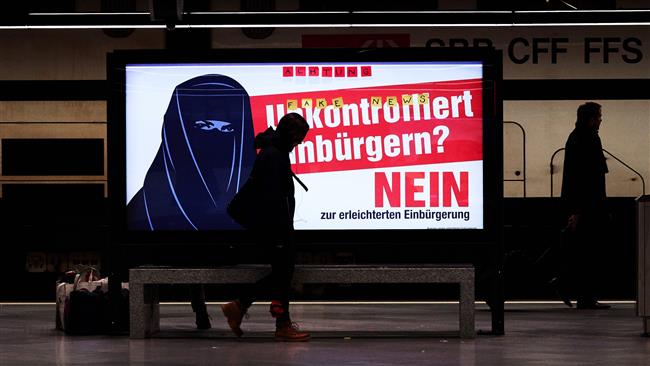Upper house of Swiss parliament rejects bill to ban Islamic full-face veil
The upper house of Switzerland’s parliament has rejected a controversial bill that would have banned Muslim women from wearing an Islamic face veil called burqa.
The Council of State voted on Thursday against the measure, which had been approved by the lower house of the parliament back in September last year.
The initiative had been led by the far-right Swiss People’s Party and would have changed the constitution to ban face-covering clothing in public.
The lawmaker behind the botched bill, Walter Wobmann, is collecting signatures to launch a referendum on the ban. He has claimed that his campaign, called “Yes to a ban on face-covering,” has so far collected over two-thirds of the 100,000 signatures needed to force a referendum.
Andrea Caroni, another lawmaker who has opposed the ban, praised the “very clear decision” by the upper house of the parliament but said a “real battle” loomed when a potential referendum was to be held.

He said banning the burqa was “not relevant at all” in Switzerland, where about five percent of its population — about 8.2 million people — are Muslim.
The supporters of the ban cite “security” concerns about the full-face covering. Opponents, however, say that national legislators should try to stay out of “the clothing closet.”
The Italian-speaking Ticino region in southern Switzerland has already imposed a ban on burqas.
Several European countries have also adopted restrictions on the Islamic clothing since 2000. France became the first European Union country to ban the public wearing of burqa in April 2011. A law took effect in Belgium in July that year that banned any clothing that obscured the identity of the wearer in public.
In the Netherlands, a proposed law banning burqas is awaiting approval by the senate. It was approved by the lower house of the Dutch parliament in November 2016.
Malaysia working on resolution to expel Israel from United Nations
Israeli military made no territorial gain in Lebanon: Report
VIDEO | 70 Palestinians killed in Israeli strikes across Gaza Strip
US Election Day: First votes cast in New Hampshire
Nov. 4: ‘Axis of Resistance’ operations against Israeli occupation
Britons demand release of pro-Palestine activists
VIDEO | Israel's unwinnable war in Lebanon
Non-aligned nations condemn Israeli violation of Iran's sovereignty













 This makes it easy to access the Press TV website
This makes it easy to access the Press TV website